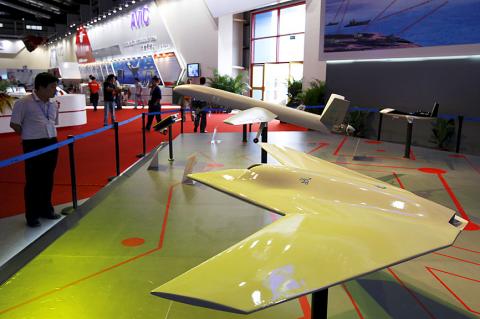China plans to build nearly 42,000 military drones over the next eight years, a Pentagon report estimated on Friday.
The land and sea-based drones are expected to cost about US$10.5 billion.
While the US Department of Defense’s annual report to US Congress on the Chinese military did not detail the potential impact of such a huge drone fleet on Taiwan, an analyst at a Washington-based think tank said it would be “substantial.”

Photo: Reuters
He said the autonomous aerial vehicles would be used to gather intelligence on a constant basis,and in the case of military conflict, could fill the skies over Taiwan to stage bombing and missile attacks.
Extensive references in the report to the Chinese threat to Taiwan are carried in separate Taipei Times coverage.
Three of the drones now under development, the Yilong, Sky Saber and Lijian, are to be configured to fire precision weapons, the report said.
“The acquisition and development of longer-range [drones] will increase China’s ability to conduct long-range reconnaissance and strike operations,” the report said. “China is working on a range of technologies to attempt to counter US and other countries’ ballistic missile defense systems, including maneuverable re-entry vehicles; multiple, independently targetable re-entry vehicles; decoys, chaff, jamming and thermal shielding... The US and China acknowledge that the Chinese tested a hypersonic glide vehicle [last year].”
This last weapon can travel at 10 times the speed of sound and is designed to carry nuclear warheads, reports showed.
It added that China is increasing the lethality of its conventional missile force by fielding a new ballistic missile, the CSS-11 (DF-16) which possesses an estimated range of 800km to 1,000km.
“The CSS-11, coupled with the already deployed conventional variant of the CSS-5 (DF-21) medium-range ballistic missile will improve China’s ability to strike not only Taiwan, but other regional targets,” the report said.
It said that the Chinese military is an arm of the Chinese Communist Party (CCP) and its top priority is not to defend the nation, but to preserve the power of the party.

DAREDEVIL: Honnold said it had always been a dream of his to climb Taipei 101, while a Netflix producer said the skyscraper was ‘a real icon of this country’ US climber Alex Honnold yesterday took on Taiwan’s tallest building, becoming the first person to scale Taipei 101 without a rope, harness or safety net. Hundreds of spectators gathered at the base of the 101-story skyscraper to watch Honnold, 40, embark on his daredevil feat, which was also broadcast live on Netflix. Dressed in a red T-shirt and yellow custom-made climbing shoes, Honnold swiftly moved up the southeast face of the glass and steel building. At one point, he stepped onto a platform midway up to wave down at fans and onlookers who were taking photos. People watching from inside

A Vietnamese migrant worker yesterday won NT$12 million (US$379,627) on a Lunar New Year scratch card in Kaohsiung as part of Taiwan Lottery Co’s (台灣彩券) “NT$12 Million Grand Fortune” (1200萬大吉利) game. The man was the first top-prize winner of the new game launched on Jan. 6 to mark the Lunar New Year. Three Vietnamese migrant workers visited a Taiwan Lottery shop on Xinyue Street in Kaohsiung’s Gangshan District (崗山), a store representative said. The player bought multiple tickets and, after winning nothing, held the final lottery ticket in one hand and rubbed the store’s statue of the Maitreya Buddha’s belly with the other,

‘COMMITTED TO DETERRENCE’: Washington would stand by its allies, but it can only help as much as countries help themselves, Raymond Greene said The US is committed to deterrence in the first island chain, but it should not bear the burden alone, as “freedom is not free,” American Institute in Taiwan Director Raymond Greene said in a speech at the Institute for National Defense and Security Research’s “Strengthening Resilience: Defense as the Engine of Development” seminar in Taipei yesterday. In the speech, titled “Investing Together and a Secure and Prosperous Future,” Greene highlighted the contributions of US President Donald Trump’s administration to Taiwan’s defense efforts, including the establishment of supply chains for drones and autonomous systems, offers of security assistance and the expansion of

STREAMLINED: The dedicated funding would allow the US to transfer equipment to Taiwan when needed and order upgraded replacements for stockpiles, a source said The US House of Representatives on Thursday passed a defense appropriations bill totaling US$838.7 billion, of which US$1 billion is to be allocated to reinforcing security cooperation with Taiwan and US$150 million to replace defense articles provided to the nation. These are part of the Consolidated Appropriation Act, which the US House yesterday passed with 341 votes in favor and 88 against. The act must be passed by the US Senate before Friday next week to avoid another government shutdown. The US House Committee on Appropriations on Monday unveiled the act, saying that it allocates US$1 billion for the Taiwan Security Cooperation Initiative